a dill pickle Part1莳萝泡菜
- 格式:dps
- 大小:1.52 MB
- 文档页数:22
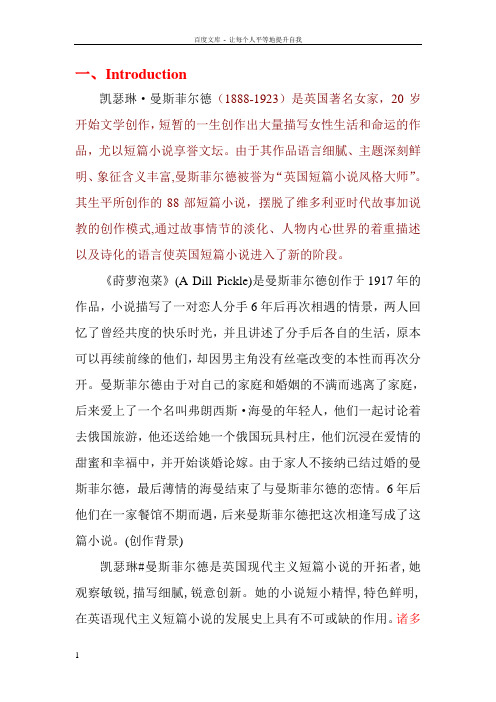
一、I ntroduction凯瑟琳·曼斯菲尔德(1888-1923)是英国著名女家,20岁开始文学创作,短暂的一生创作出大量描写女性生活和命运的作品,尤以短篇小说享誉文坛。
由于其作品语言细腻、主题深刻鲜明、象征含义丰富,曼斯菲尔德被誉为“英国短篇小说风格大师”。
其生平所创作的88部短篇小说,摆脱了维多利亚时代故事加说教的创作模式,通过故事情节的淡化、人物内心世界的着重描述以及诗化的语言使英国短篇小说进入了新的阶段。
《莳萝泡菜》(A Dill Pickle)是曼斯菲尔德创作于1917年的作品,小说描写了一对恋人分手6年后再次相遇的情景,两人回忆了曾经共度的快乐时光,并且讲述了分手后各自的生活,原本可以再续前缘的他们,却因男主角没有丝毫改变的本性而再次分开。
曼斯菲尔德由于对自己的家庭和婚姻的不满而逃离了家庭,后来爱上了一个名叫弗朗西斯·海曼的年轻人,他们一起讨论着去俄国旅游,他还送给她一个俄国玩具村庄,他们沉浸在爱情的甜蜜和幸福中,并开始谈婚论嫁。
由于家人不接纳已结过婚的曼斯菲尔德,最后薄情的海曼结束了与曼斯菲尔德的恋情。
6年后他们在一家餐馆不期而遇,后来曼斯菲尔德把这次相逢写成了这篇小说。
(创作背景)凯瑟琳#曼斯菲尔德是英国现代主义短篇小说的开拓者,她观察敏锐,描写细腻,锐意创新。
她的小说短小精悍,特色鲜明,在英语现代主义短篇小说的发展史上具有不可或缺的作用。
诸多学者从多方面对曼斯菲尔德做了颇多的研究,如耿宁探讨了曼斯菲尔德小说的现代主义倾向;王烨剖析了印象主义表现手法对曼斯菲尔德艺术风格的影响;曾秀烨研究了莳萝泡菜中象征手法的运用。
同时,廖群分析了曼斯菲尔德小说人物话语的表达方式,沈秀丽论述了曼斯菲尔德女性主题小说的人物心理特征。
本文将以莳萝泡菜为例,深入解读曼斯菲尔德小说中象征主义的运用以刻画人物心理的娴熟技法。
作者赋予了事物以全新的丰富象征意义,用有形有色的物象来暗示主人公的内心想法。
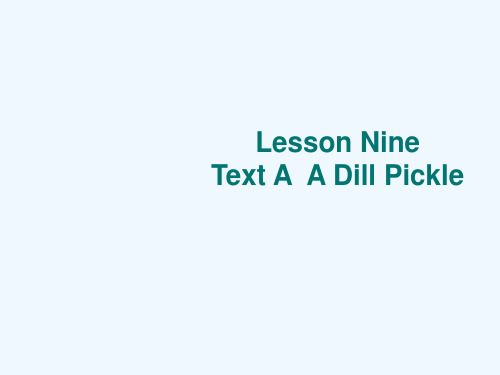
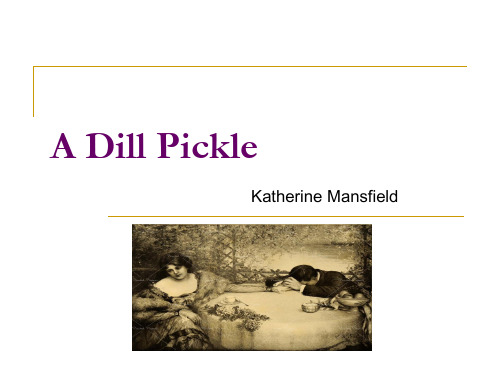

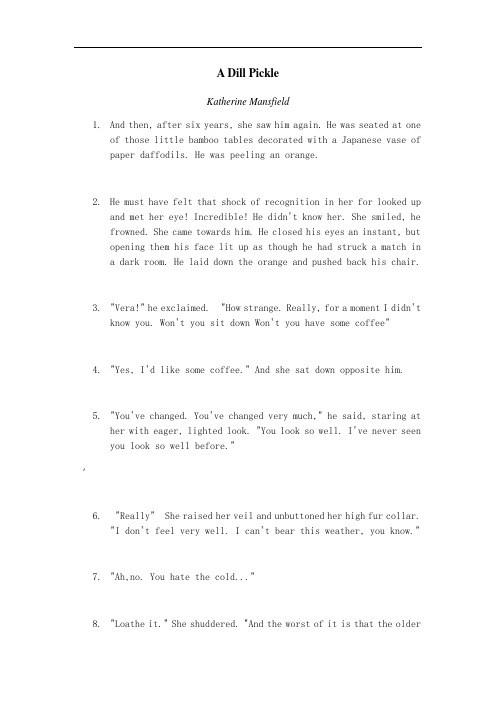
A Dill PickleKatherine Mansfield1.And then, after six years, she saw him again. He was seated at oneof those little bamboo tables decorated with a Japanese vase of paper daffodils. He was peeling an orange.2.He must have felt that shock of recognition in her for looked upand met her eye! Incredible! He didn't know her. She smiled, he frowned. She came towards him. He closed his eyes an instant, but opening them his face lit up as though he had struck a match ina dark room. He laid down the orange and pushed back his chair.3."Vera!" he exclaimed. "How strange. Really, for a moment I didn'tknow you. Won't you sit down Won't you have some coffee"4."Yes, I'd like some coffee." And she sat down opposite him.5."You've changed. You've changed very much," he said, staring ather with eager, lighted look. "You look so well. I've never seen you look so well before.")6. "Really" She raised her veil and unbuttoned her high fur collar."I don't feel very well. I can't bear this weather, you know."7."Ah,no. You hate the cold..."8."Loathe it." She shuddered. "And the worst of it is that the olderone grows..."9.He interrupted her. "Excuse me," and tapped on the table forwaitress. "Please bring some coffee and cream." To her:" You are sure you won't eat anything"10."No, thanks. Nothing."11.&12."Then that's settled." And smiling he took up the orange again."You were saying--the older one grows--"13."The colder," she laughed. But she was thinking how well sheremembered that trick of his--the trick of interrupting her--and of how it used to exasperate her six years ago.14."The colder," he echoed her words, laughing too. "Ah, ah. You stillsay the same things and there is another thing about you that is not changed at all-- your beautiful voice. I don't know what it is-- I've often wondered--that makes your voice such a --haunting memory... Do you remember that first afternoon we spent together at Kew Garden You were so surprised because I did not know the names of any flowers. I am still just as ignorant for all your telling me. But whenever it's very fine and warm, and I see some bright colour I hear your voice saying:"Geranium, marigold, and verbena,"You remember that afternoon"15." Oh,yes,very well." She drew a long, soft breath. Yet, what hadremained in her mind of that particular afternoon was an absurd scene. A great many people taking tea in a Chinese pagoda, and he behaving like a maniac about the wasps--waving them away, flappingat them with his straw hat, serious and infuriated out of all proportion to the occasion. How she had suffered.16.But now, as he spoke, that memory faded. His was the truer.17.Yes, it had been a wonderful afternoon, full of flowers and --warmsunshine. Her thoughts lingered over the last two words. And in the warmth, as it were, another memory unfolded. She saw herself sitting on a lawn. He lay beside her, and suddenly, he rolled over and put his head in her lap./18."I wish," he said in a low, troubled voice," I wish that I had takenpoison and were about to die-- here now!"19.She leaned over him.20."Ah, why do you say that"21.But he gave a kind of soft moan, and taking her hand he held itto his cheek.22."Because I know I am going to love you too much. And I shall sufferso terribly, Vera, because you never, never will love me."23.!24.He was certainly far better looking now than he had been then. Hehad lost all that dreamy vagueness and indecision. Now he had theair of a man who has found his place in life. He must have made money, too. His clothes were admirable, and at that moment he pulled a Russian cigarette case out of his pocket.25."Won't you smoke"26."Yes, I will." She hovered over them. "They look very good."27."I get them made for me by a little man in St James's Street. Idon't smoke very much, but when I do, they must be delicious.Smoking isn't a habit with me; it's a luxury--like perfume. Are you still so fond of perfumes Ah, when I in Russia..."28.She broke in:"You've really been to Russia"29."Oh, yes. I was there for over a year. Have you forgotten how weused to talk of going there"30.^31."No, I've not forgotten."32.He gave a strange half laugh and leaned back in his chair.33."Isn't it curious I have really carried out all those journeys thatwe planned. In fact, I have spent the last three years of my life travelling all the time. Spain, Corsica, Siberia, Russia, Egypt.The only country left is China, and I mean to go there, too, when the war is over."34.As he spoke, so lightly, tapping the end of his cigarette againstthe ashtray, she felt the strange beast that had slumbered so long within her bosom stir, stretch itself, yawn, prick up its ears, and suddenly bound to its feet, and fix its longing, hungry stare upon those far away places. But all she said was, smiling gently:"How I envy you."35."It has been," he said, "Wonderful--especially Russia. I evenspent some days on a river boat on the Volga. DO you remember that boatman's song that you used to play"36."Yes." It began to play as she spoke.¥37."Do you even play it now"38."No, I've no piano."39.He was amazed at that. "Bfut what has become of your beautifulpiano"40.She made a little grimace."Sold. Ages ago."41."But you were so fond of music," he wondered.42.】43."I've no time for it now."said she.44.He let it go at that." That river life," he went on, "is somethingquite special. After a day or two you can't realize that you have even known another. And it is not necessary to know the language-- the life of the boat creates a bond between you and the people that's more than sufficient. You eat with them, pass the day with them, and in the evening there is that endless singing."45.She shivered, hearing the boatman's song break out again loud andtragic, and seeing the boat floating on the darkening river with melancholy trees on either side...46."You'd like almost everything about Russia life," he said warmly."It's so informal, so impulsive, so free. And then the peasants are so splendid. I remember the evening some friends and I went for a picnic by the Black Sea. We took supper and champagne and ate and drank on the grass. And while we were eating the coachman came up."Have a dill pickle," he said. He wanted to share with us: That seemed to me so right, so --you know what I mean"47.And she seemed at that moment to be sitting on the grass besidethe mysteriously Black Sea, black as velvet, and rippling against the banks in silent, velvet waves. She saw the little group on the grass, their faces and hands white in the moonlight. Apart from them, with his supper in a cloth on his knees, sat the coachman."Have a dill pickle," said he, and although she was not certain what a dill pickle was, she saw the greenish glass jar with a red chili like a parrot's beak.48."Yes, I know perfectly what you mean," she said.…49.In the pause that followed they looked at each other. In the pastwhen they had looked at each other like that they had felt that their souls had, as it were, put their arms round each other and dropped into the same tea, content, to be drowned, like mournful lovers. But now, he said:" What a marvelous listener you are. When you look at me with those wild eyes I feel that I could tell you things that I would never breathe to another human being."50.Was there just a hint of mockery in his voice She could not be sure.51."How well I remember one night, the night that I brought you thelittle Christmas tree, telling you all about my childhood. And of how I was miserable that I ran away and lived under a cart in our yard for two days without being discovered. And you listened, and your eyes shone, and I felt that you had even made the little Christmas tree listen too, as in a fairy story."52."The dog was called Bosun," she cried, delightedly.53.But he did not follow." What dog Had you a dog"54.)55."No, no. I meant the yard dog when you were a little dog."56.He laughed and snapped the cigarette case to.57."Was he Do you know I had recognized you today-- I had to take sucha leap back to that time." He drummed on the table " I've oftenthought how I must have bored you. And now I understand so perfectly why you wrote to me as you did-- although at the time that letter nearly finished my life. I found it again the other day, and Icouldn’t help laughing as I read it, It was so clever--such a true picture of me." He glanced up. " You're not going"58.She had buttoned her collar again and drawn down her veil.59."Yes, I am afraid I must,"she said, and managed a smile.60."Ah, no,please,"he pleaded. "Don't go just for moment," and hecaught up one of her gloves from the table and clutched at if as if that would hold her. "I see so few people to talk to nowadays, that I have turned into a sort of barbarian," he said."Have I said something to hurt you"、61."Not a bit." She lied. But as she watched him draw her glove throughhis fingers, gently, gently, her anger really did die down.62."What I really wanted then," he said softly,"was to be a sort ofcarpet-- for you to walk on so that you need not be hurt by the sharp stones and the mud you hated so. It was nothing more selfish than that. Only I did desire, eventually, to turn into a magic carpet and carry you away to all those lands you longed to see."63.As he spoke she lifted her head as though she drank something; thestrange beast in her bosom began to purr . . .64."I felt that you were more lonely than anybody else in the world,"he went on, "and yet, perhaps, that you were the only person in the world who was really, truly alive.65.Ah, God! What had she done! How had she dared to throw away herhappiness like this! This was the only man who had ever understood her. Was it too late Could it be too late66.&67."And then the fact that you had no friends and never had madefriends with people. How I understood that, for neither had I. Is it just the same now"68."Yes," she breathed. "Just the same. I am as alone as ever."69."So am I," he laughed gently, "just the same."70.Suddenly with a quick gesture he handed her back the glove andscraped his chair on the floor. "But what seemed to me so mysterious then is perfectly plain to me now. And to you, too, of course. . . .It simply was that we were such egoists, so self-engrossed, so wrapped up in ourselves that we hadn't a corner in our hearts for anybody else. Do you know," he cried, naive and hearty.71.She had gone. He sat there, thunder-struck, astounded beyondwords.1.六年之后她又见到了他。
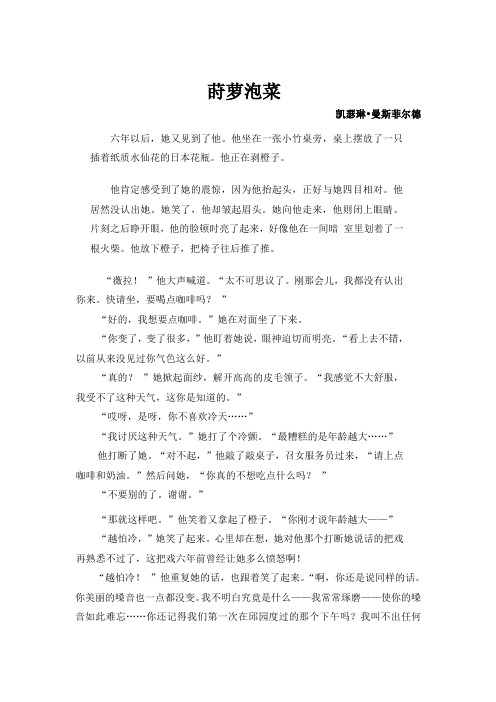
莳萝泡菜凯瑟琳•曼斯菲尔德六年以后,她又见到了他。
他坐在一张小竹桌旁,桌上摆放了一只插着纸质水仙花的日本花瓶。
他正在剥橙子。
他肯定感受到了她的震惊,因为他抬起头,正好与她四目相对。
他居然没认出她。
她笑了,他却皱起眉头。
她向他走来,他则闭上眼睛。
片刻之后睁开眼,他的脸顿时亮了起来,好像他在一间暗室里划着了一根火柴。
他放下橙子,把椅子往后推了推。
“薇拉!”他大声喊道。
“太不可思议了。
刚那会儿,我都没有认出你来。
快请坐,要喝点咖啡吗?”“好的,我想要点咖啡。
”她在对面坐了下来。
“你变了,变了很多,”他盯着她说,眼神迫切而明亮。
“看上去不错,以前从来没见过你气色这么好。
”“真的?”她掀起面纱,解开高高的皮毛领子。
“我感觉不大舒服,我受不了这种天气,这你是知道的。
”“哎呀,是呀,你不喜欢冷天……”“我讨厌这种天气。
”她打了个冷颤。
“最糟糕的是年龄越大……”他打断了她。
“对不起,”他敲了敲桌子,召女服务员过来,“请上点咖啡和奶油。
”然后问她,“你真的不想吃点什么吗?”“不要别的了。
谢谢。
”“那就这样吧。
”他笑着又拿起了橙子。
“你刚才说年龄越大——”“越怕冷,”她笑了起来。
心里却在想,她对他那个打断她说话的把戏再熟悉不过了,这把戏六年前曾经让她多么愤怒啊!“越怕冷!”他重复她的话,也跟着笑了起来。
“啊,你还是说同样的话。
你美丽的嗓音也一点都没变。
我不明白究竟是什么——我常常琢磨——使你的嗓音如此难忘……你还记得我们第一次在邱园度过的那个下午吗?我叫不出任何花的名字,你对此感到非常惊讶。
尽管那时你跟我说了很多,但我现在还是什么都不知道。
不过,每当天气晴朗又暖和的时候,我一看到艳丽的色彩就会想起你的声音,‘天竺葵、万寿菊、美人樱,’你还记得那个下午吗?”“哦,当然记得,记得很清楚。
”她缓缓地深吸了一口气。
不过,她记忆里那个不寻常的下午却是个滑稽可笑的场面。
那时很多人在一个中式亭子里喝茶,他却像个疯子一样对付黄蜂——挥赶它们,用草帽拍打它们。
Lesson 9TEXT A A Dill PickleBy Katherine MansfieldAug. 24, 2005 I. About the Author:II. About the Title:Dill: n. an aromatic herb native to Eurasia with finely dissected leaves and small yellow flowers clustered in umbels. 【植】莳萝(产于欧亚的一种芳香型草本植物,长有纤细分裂的叶子和成伞形花序的小黄花簇),草茴香。
the leaves or seeds of this plant, used as a seasoning. 莳萝的种子(这种植物的叶子和籽可用作调味品)。
dill pickle莳萝泡菜Pickle: an edible product, such as a cucumber, that has been preserved and flavored in a solution of brine or vinegar. 腌菜,泡菜(一种在盐水或醋溶液中保存和调味的可食性产品,如腌黄瓜)。
III. About the Text:Focus: Interpretation of the theme or themes linked to understand the two characters what happened to them 6 years ago, why don’t they live together since both of them are single. Difficulty: use of symbols.Content and theme:a) learn to piece together the plot of a fragmentary story. b) give character sketches of the 2 people in the story and find out evidence from the text to support the sketches. c) discuss the major themes of the story.Techniques and Languages:Use of metaphors and symbolsUse of stream of consciousness (Para. 16 --- 21)Use of point of view/perspective.Mansfield’s style.Questions for preview:1. The first series of questions are related to the plot of the story.What is the plot of the story? How is the plot revealed? Is there much action in the story? Do you like this way of telling stories?2. The second series of questions are related to the understanding of the character.How could you describe the two characters and why? How are they portrayed? Do you like these kinds of people? Is the man insensitive, or is the woman oversensitive?3. What are some of the major symbols?4. Work in pairs and imagine yourselves to meet former lovers who haven’t seen each other for 6 years. Now you supposed to design the dialogue with your former lovers.IV. Details of the Text and Language Points:Part One (para. 1 --- 12): The greeting of the two former lovers.Q: What do you think of the beginning?A: Arousing the reader’s curiosity: What is their relationship? How do you think the story would go on in your imagination?Q: Don’t you know your former boyfriend/girlfriend only six years later?A: No. He/She should be the person at the bottom of my heart, should never be forgotten.Q: What do you think of the trick of interrupting?A: His habit of interrupting her, disrespectful, self-involved, showing little interest in bearing what she wants to say or how she feels perhaps is one of the reasons for her to leave him --- selfish.(1)Daffodil: n. a bulbous plant with showy, usually yellow flowers with a trumpet-shaped central crown. 黄水仙(一种球茎状的植物,开有艳丽的,通常为黄色的花和喇叭状的花冠)。
对文章莳萝泡菜的理解李杰【期刊名称】《海外英语(上)》【年(卷),期】2015(000)002【摘要】As we all know a dill pickle tastes sour, spicy, bitter and sweet. After learning the text written by Katherine Mansfield, I am impressed by the symbolic meanings of the title A Dill Pickle. I think it has something to do with Vera and the man, which reflects Katherine Mansfield’s feminism. However, I feel strongly that the author treats the man unfairly since the reasons why Vera left the man are far-fetched. I will also analyze my view from the symbolic meanings of the title.%众所周知,莳萝泡菜尝起来酸,甜,苦,辣。
在学习了由凯瑟琳·曼斯菲尔德写的这篇文章之后,我对标题莳萝泡菜的象征意义印象深刻,我认为这和维拉以及男主人公有关,这反映了凯瑟琳·曼斯菲尔德的女性主义思想,可是,我觉得作者对待男主公很不公平,因为维拉离开男主人公的理由很牵强。
我会分析我对文章标题象征意义的看法。
【总页数】2页(P195-196)【作者】李杰【作者单位】河海大学,江苏南京211100【正文语种】中文【中图分类】H312【相关文献】1.《莳萝泡菜》中薇拉的逃离 [J], 郭冬林2.对文章莳萝泡菜的理解(英文) [J], 李杰3.符号学视角下《莳萝泡菜》的隐喻解读 [J], 杨依依4.《莳萝泡菜》中的复调与对话 [J], 郭冬林5.解读凯瑟琳·曼斯菲尔德小说《莳萝泡菜》中的隐性进程——从单向反讽到双向反讽 [J], 朱娟娟因版权原因,仅展示原文概要,查看原文内容请购买。
《莳萝泡菜》打这以后,过了六年,她又遇到了他,他坐在一张小竹桌旁,桌子上摆着盛满纸水仙的花瓶.他正在那里剥着橙子.既然他抬起了头,与她的视线相遇,他肯定感到了她那种认出他的惊讶.真是莫明其妙!他不认识她.她微笑着,他皱着眉头.她向他走过去,他马上闭上了眼睛,但又睁开了,脸上放出光芒,仿佛在漆黑的屋里点燃了一根火柴.“维拉!”他叫喊到,真是没想到,真的,我刚才没认出你来.坐下,喝杯咖啡好吗?””好吧,来杯咖啡.”她在他的对面坐下.“你变了,变了许多.”他说道,并用渴望、闪亮的目光注视着她。
“你看上去很好,我以前从来没有见过你如此容光焕发。
”“真的?”她撩起面纱,解开她那毛茸茸的高皮领。
“其实我并不感到很舒服,这你是知道的,我受不了这里的天气。
‘“对了,你讨厌寒冷……“对,我是讨厌寒冷。
”她打了个寒颤。
“我最讨厌的是这里滋生着冷酷的人……”“对不起,”他打断了她,接着他敲着桌子招呼侍者。
“请来些咖啡和奶油。
” 又对她说:“你真的不吃点东西吗?”“不吃,谢谢,什么都不吃。
”“那么就要这些吧。
”他面带笑容,又继续剥橙子。
“你刚才说——滋生着冷酷的人——”“冷酷的人,”她笑着说。
然而,她对以前他所开的玩笑是那么记忆犹新——就是把她惹急了的那个玩笑——就是六年前曾让她恼怒的那个玩笑。
“冷酷的人!”他重复着她的话,同样笑了起来。
“啊哈,你还提那些事。
其实还有一件有关你的事,就是你那动人的嗓音——至今未变。
不知怎么地——我总是在琢磨——是什么使你的声音如此地——萦绕在我的记忆中……你还记得我们在凯屋花园一起度过的第一个下午吗?因为当时我叫不出那些花的名字,你感到很吃惊。
你告诉我的那些花名我至今还是不知道。
尽管如此,每当天气晴朗,风和日丽,我看到那绚丽多彩的颜色时,耳边便回响起你的声音:天竺花、金盏花、还有美人樱……你还记得那天下午吗?”“记得,记得很清楚。
”她深深地,轻轻地吸了一口气。
然而,留在她记忆中的那个特别的下午却是一个荒唐的景象。
故事讲述了女主人公薇拉在与男友分手六年后仍孑然一身,男友却春风得意,过着讲究的生活,而薇拉因生活窘迫,不得不把心爱的钢琴变卖了。
六年前因为男友的虚浮不实离开了他,六年之后再次相逢,他还是那么爱夸夸其谈,随意打断薇拉的话。
当他听到薇拉以一句“我现在没有时间弹”来解释为什么卖掉了心爱的钢琴后,他却并没有追问下去,只一味炫耀般地讲述着薇拉曾也那么向往的俄国风情,作者在此讽刺了男主人公的自私与无情。
她起身要走,他却极力挽留。
接下来的一番话几乎使薇拉砰然心动:“I felt that you were more lonely than anybody else in the world he went on, and yet, perhaps, that you were the only person in the world who was really, truly alive.”接下来他却突然笑起来,说道“It simply was that we were such egoists, so self-engrossed, so wrapped up in ourselves that we hadn't a corner in our hearts for anybody else”,薇拉心中对他仅存的一丝希望彻底幻灭了,他依然是六年前那么自私自大,只关心自己的人,于是又一次决然地离开了他。
两位主人公的出场是的环境描写,对人物性格也有极大的暗示。
文中出现了“a Japanese vase of paper daffodils”,水仙花的花语是“自我陶醉,自我欣赏”,预示着男主人公的自恋自大,注重自我享受的性格特点。
而薇拉刚出场时把自己包裹在高领皮衣、面纱、手套中则象征着六年的寻寻觅觅,苦苦谋生使薇拉将自己保护在层层伪装下,见到男主人公后,薇拉暂时卸下了心理的戒备,揭开了高领皮衣的衣领,揭起了面纱,摘下了手套。
A Dill PickleKatherine MansfieldAuthor Unit 3A Dill PickleBackgroundHistoryKatherine Mansfield (1888-1923)•rebellious, dangerously witty, and lonely•creative years burdened withloneliness, illness, jealousy andalienation: bitter depiction ofmarital and family relationships •died of TB —the “romantic disease”H e r L i f eH e r W o r k s •In a German Pension (1911)•The Garden Party: and Other Stories (1922)•The Doves’ Nest: and Other Stories (1923)•Bliss: and Other Stories (1923)H e rI n f l e u e n c •Revolutionized the English short story;•Marked the maturity of English short story;•Was often compared to Dickens and Chekhov.1.Women’s condition at the time:Women were advocated to cultivate such qualities as “tenderness of understanding,unworldliness and innocence,domestic affection,and above all, submissiveness in various degrees.”2.“The Woman Question”:R ising wave of feminist movement(late Victorian age to the early20th century)History BackgroundDetailed Analysis CharacterAnalysisA Dill PickleTextAnalysisUnit 3And then, after six years, she saw him again. She had met him before.They had not seen each other for six years.Their relationship was not clear at this point.He was peeling an orange.peel an orange:take off the peel of an orangeto peel potatoes;to husk the rice;to shell the peas;to skin a cat;to gut the fish;to dust the tablesHe didn't know her. She smiled, he frowned. She came towards him. He closed his eyes anSimile(明喻)instant, but opening them his face lit up asthough he had struck a match in a dark room.She smiled and came towards him means that they had known each other very well six years before.she smiled because she was very glad to see her old friend.he frowned because he did not recognize her.closed his eyes an instant and then face lit up showed that he recall that woman.light up | light sth↔up1.(informal)to begin to smoke a cigarette开始抽烟They all lit up as soon as he left the room.他一离开房间他们就都抽起烟来。
2.to become or to make sth become bright with light or colour (使)光亮,放光彩There was an explosion and the whole sky lit up.一声爆炸照亮了整个天空3.if sb's eyes or face light up,or sth lights them up,they show happiness or excitement喜形于色;喜气洋洋His eyes lit up when she walked into the room.看见她走进房间,他两眼一亮。
A smile lit up her face.她微微一笑,脸上露出了喜色as if/as thoughin a way that suggests sth似乎;好像;仿佛He behaved as if nothing had happened.他表现得若无其事。
It sounds as though you had a good time.听起来你好像过得挺愉快。
It's my birthday.As if you didn't know!今天是我的生日。
你好像不知道似的!Expansioneven if/though(despite the fact or belief that;no matter whether)即使;纵然;虽然(formal)exactly as if…;exactly like sb/sth简直像是;恰似matchn.比赛;对手;相配的人(或物);火柴vt.相同;适应;使较量;使等同于vt.&vi.使相配,使相称make a match配对;做媒,使结合meet one's match遇到实力相当的对手,棋逢敌手put a match to点燃match up to比得上;与…相符合she matches up to the challenges of the job.她能适应这项工作的考验。
match someone with使…嫁(或娶)Try if you can to match her with a duke.可能的话你尽量把她嫁给一位公爵。
"You've changed. You've changed very much," he said, staring at her with that eager, lighted look. "You look so well. I've never seen you look so well before."The man said Vera changed and looked well.But I think he was lying."I don't feel very well. I can't bear this weather, you know." "Loathe it." She shuddered. "And the worst of it is that the older one grows . . . "A dishonest man''Loathe it." She shuddered.loathe:to hate very well厌恶synonyms:dislike hate ~+v-ing be loath to doshudder:to shake because you are cold or frightened,or because ofa strong feeling(因寒冷、害怕或激动)发抖,打颤,战栗synonyms:shiver~(with sth)|~(at sth)some words appear in the article:shock;astound exasperate;angrybear;tolerate"Then that's settled." And smiling he took up the orange again. "You were saying–the older one grows–"➢You were saying:an expression used to encourage someone you just interrupted to continue to speak.He interrupted her in the first time,he wanted to control the subject by himself.settlevt.解决;安排;使定居;使沉淀;vi.下沉;定居;n.高背长靠椅;synonym:decide determine fix inhabit locate mend occupy patch up reconcile resolveantonym:unfixsettle one's affairs(或estate)安排后事settle someone's hash(非正式)彻底制服某人,摆平某人;settle down 1.安顿下来:过稳定有序的生活2.平静:变得不紧张或安静settle for勉强接受:尽管不完全满意也能接受But she was thinking how well she remembered that trick of his–the trick of interrupting her–and of how it used to exasperate her six years ago.This could witnessed the man and Vera may fell in love six years ago. But the ralationship between them were not assured.that trick of his➢more emphatic than“his trick”,e.g.“look at that son of yours,”the husband shouted at his wife,“he stinks!”I like that dog of yours.It looks so lovely.Character AnalysisThe flower message of daffodils is narcissism(自恋) and self-absorbing(自我陶醉).The man was self-engrossed and lived in his own word.''Loathe it." She shuddered.He interrupted her."Excuse me,"and tapped on the table for the waitress.It reflected his selfishness,hypocrisy(虚伪)and indifference.The action of"tapped on the table"shows his arrogance(自大,傲慢).VeraBut she was thinking how well she remembered that trick of his-the trick of interrupting her-and of how it used to exasperate her six years ago.She was quite reminiscent.。